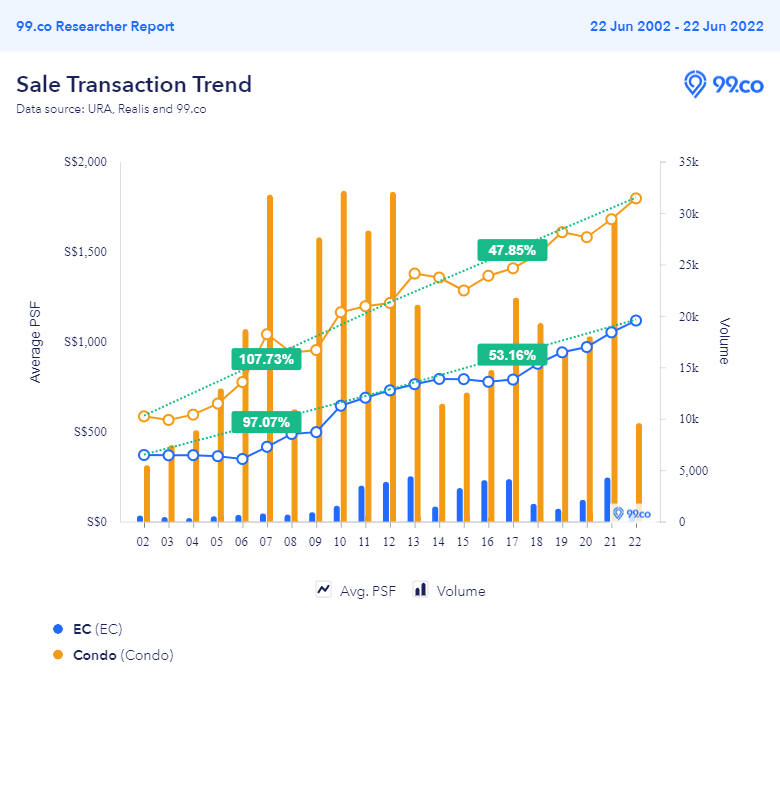When should you pick a regular condo over an EC?

While an Executive Condominium (EC) is more attractive price-wise, there are sometimes good reasons to pick a regular condo.
Here's what you need to consider.
The key points of difference to note are:
The biggest difference between a regular condo and an EC comes in the first 10 years. During this time, ECs count as HDB properties.
They're subjected to the Minimum Occupation Period (MOP) of five years.
You can't sell or rent out the whole EC unit during this time. (You can rent out the rooms, but will still have to notify HDB about it.)
This makes a big difference if you're more focused on investment than home ownership. For instance, your plan is to stay with your parents, and then buy and rent out a condo.
Yes, the capital outlay to buy a new EC is cheaper than buying a condo. For instance, a three-bedder at North Gaia averages around $1.3 million.
In comparison, a three-bedder at The Commodore averages around $1.5 million. So you save around $200,000 with an EC.
You can get a bank loan of $975,000 for your EC (at a maximum LTV of 75 per cent).
Assuming an interest rate of two per cent per annum, over 25 years, this comes to a total monthly repayment of about $4,133.
Now you can't rent out the unit for the first five years, so you're forced to pay this mortgage out of pocket.
Over a period of five years, that comes to a cost of $247,980 - more than the $200,000 you "saved".
Even if you decide to rent out one of the rooms, you'd still be earning less than what you'd have made if you were to go for a condo and rent out the whole unit.
READ ALSO: 8-step guide to buying a new-launch condo in Singapore
There is a limitation on selling a regular condo, in the form of the Seller's Stamp Duty (SSD).
This stamp duty imposes a tax of 12 per cent if you sell in the first year, eight per cent in the second year, and 4per cent in the third year.
However, you're free to sell without penalty from the fourth year onward. This is still two years shorter than the MOP.
This sort of flexibility can be important. For example, what happens if you face a financial emergency in the fourth or fifth year, and need to downgrade?
With an EC, you're stuck due to the MOP. With a regular condo, you can quickly cash out to downgrade and tackle the situation.
If your financial situation is more volatile than most people (e.g. you run your own business, or work on commissions), don't underestimate the importance of having no MOP restriction.
On top of that, an EC has a limited pool of buyers during the five years after its MOP. Remember that ECs count as HDB properties until the 11th year onwards. This means you can't sell the EC to a foreigner.
As any property agent can tell you, though, narrowing the pool of buyers lowers your odds of finding a good price.
You need to qualify under one of the following schemes to buy an EC:
You need to be a Singapore citizen aged at least 21, and your co-applicant needs to be a Singapore citizen or Permanent Resident.
If you're applying under the Joint Singles Scheme, both you and your co-applicant must be citizens, and be at least 35 years old.
On top of all that, you must not own or have sold any private property (locally or abroad) for the past 30 months, and your household income cannot exceed $16,000 per month.
There is, of course, no such restriction with a regular condo. In particular, there's no age restriction.
If you're a single Permanent Resident aged 28 who can afford it, you can just go for it and get a regular condo.
READ ALSO: How to identify a good 1-bedroom layout
We're not disparaging against ECs. In fact, we think they're a pretty great deal, given that it's a way to get private housing with government subsidies.
They're also cheaper than their private counterparts with the same general location and amenities, and have a higher capital appreciation in the last 10 years. So it's hard to argue that it's a bad deal.
10 years ago, we look back at the historical data, then yes, condos have generally appreciated better than ECs.
But if we look at the past 10 years from now, it's the other way round. ECs have seen price increases of 53.16 per cent – higher than the price increase of 47.85 per cent for condos.

Nevertheless, there are some situations when a regular condo more than justifies the price difference and capital appreciation.
Based on the above, we'd say pick a regular condo if: